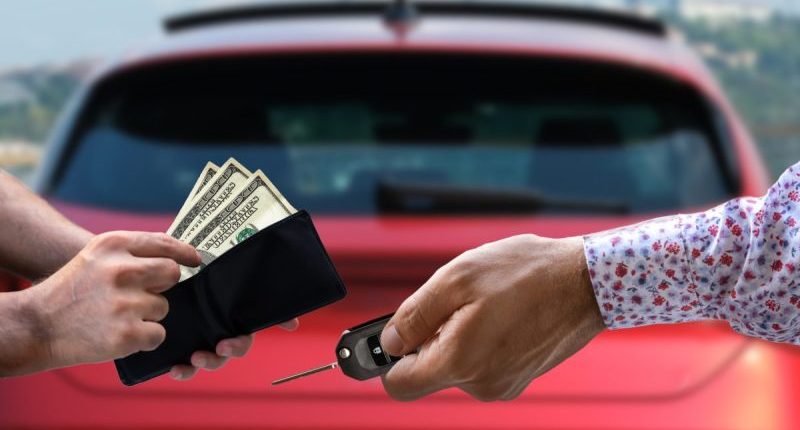Share this @internewscast.com

(iSeeCars) – You’re ready to purchase a new car but may not have plentiful funds at the moment. Navigating how to obtain a car loan should be a priority, whether you’re considering a new or used vehicle. By segmenting the process into manageable steps rather than tackling it all at once, obtaining a car loan becomes straightforward. Here’s a comprehensive guide on how to secure an auto loan with favorable rates, even if your credit score isn’t ideal.
Determine Your Credit Score
The initial step in getting a car loan is to ascertain your credit score, specifically referred to as your “FICO score,” which is a numerical depiction of your credit history.
Each year, the key credit reporting agencies – Equifax, Experian, and TransUnion – offer a complimentary credit report along with your FICO credit score. Additionally, you might check with your bank or credit card companies, as many provide a free credit report and your credit score at no extra cost.
The credit report contains a record of your credit history, including any items that are hurting (lowering) your credit score. Any previous car purchases, including the auto lenders’ names, will be listed, along with the car payment amount, interest rate, and other loan terms. If you’ve missed a car payment in the past, the financial institution likely reported it to the credit bureau, and you’ll see it here.
If your credit score is low, don’t panic. You can boost the number. Start by making sure you make your credit card and loan payments — particularly any existing auto loan payments — on time. Take care of any past-due accounts, and pay down the balance on your loans if you can, especially any revolving credit accounts. You should also avoid opening new accounts, as frequent inquiries to the credit bureaus seeking new credit can hurt your credit score.
A good credit score isn’t required to secure a car loan, but as a borrower seeking a competitive annual percentage rate (APR) on the interest you’ll pay, good credit is critical. If a bad credit score is causing a higher APR you might consider a co-signer. A co-signer, usually a close relative or very good friend, can agree to be responsible for making loan payments if you don’t, which can lower an otherwise high interest rate.
Get Pre-Approval
You should always get pre-approved for a loan before you visit the first dealership. A pre-approval means a lender has fully reviewed your credit and loan application to determine a likely loan amount and interest rate. During the pre-qualification process, the lender doesn’t look at your credit in as much detail. They’ll still give you an interest rate and a loan amount, but there’s a good chance the exact auto loan terms you’ll get, once your loan is fully approved, can change.
Determine How Much Car You Can Afford
The amount of money a lender is willing to let you borrow, and the amount you can afford to borrow, are not necessarily the same number. How much you can afford is something you need to determine long before your car purchase.
As a general rule, your car payment should not be more than 10% of your take-home pay, and your total car expenses (fuel, maintenance, insurance, registration) should not surpass 15 percent of your take-home pay.
Many sites offer a free auto loan calculator, where you can quickly determine a car payment based on the purchase price, down payment, and interest rate. Consider the impact of that monthly car payment on your overall budget. If your monthly take-home pay is $4000, your car payment shouldn’t be more than $400, and your total monthly car expenses (including the payment) should be more than $600. If the loan terms, including principal payment, interest, and any additional fees, are cutting it too close, take out a smaller car loan, even if the bank is willing to loan you more.
Consider a Down Payment
A down payment reduces the amount of the loan you need to take out, and that reduces your monthly payment. This also reduces the overall interest you’ll pay on the loan. While that can help make a car easier to afford, don’t empty your savings account. Be sure to keep enough money on hand for whatever surprises might come your way.
New or Used?
When buying a vehicle, you have the choice of buying a new or used car. One of the big perks of new cars is the reduced likelihood of unexpected repair bills. They also come with new car warranties that protect you for a limited time. A new car loan can also mean a lower interest rate, especially if the manufacturer is offering incentives to sell a specific model. These could include zero percent interest if you have a good credit score. Used cars might not be as reliable, though many now come with their own manufacturer (CPO) warranties to set your mind at ease. (Check out our guide to learn more about Certified-Pre Owned cars and if they are worth it.)
And while new cars are sold exclusively through dealers, which can often arrange an auto loan, used cars can be purchased from a dealer or a private party. A private party purchase will require you to arrange your own car loan terms, but you already did that, as we suggested above, right?
Finally, keep in mind the depreciation on a new car means there’s a much greater loss in its value in the first few years after purchase compared to a used car. If you’re going to keep your new car for the life of the loan, which will likely be between 5 and 7 years, that’s not a concern. But if you decide to switch cars earlier the vehicle’s depreciation represents a significant ownership cost, beyond interest charges, insurance, maintenance, etc. If you plan to switch cars every few years you’ll save a lot of money buying cars that are at least 3 years old. Keep in mind that cars depreciate at different rates, so buying a car that best holds its value is a smart purchase decision.
Do Your Research
A car is a major purchase, so do your research before you decide which model to buy. Seek out online reviews to see what experts think about the car you’re considering. It’s also good to research consumer reviews to see if people who did buy your car are happy or if they have complaints about reliability.
Test Drive at the Dealership
Once you narrow down your choices, make time for some test drives. No matter how good a car looks on the internet, you need to get behind the wheel and drive it. This gives you the opportunity to check on the interior quality, the comfort of the seats, and the overall performance of the car you’re considering.
Don’t let a salesperson cut your test drive short. Take as much time as you need. Also, be sure to do the kind of driving you normally do every day, whether that’s cruising on the highway or navigating downtown traffic. If you have kids, check that their car seats fit and that everyone is comfortable. A test drive is your chance to make sure the car you’re looking at will really work for you and your lifestyle. (Check out our guide on What to Look for When Buying a Used Car to help you get the most of your test drive.)
Compare Dealer Financing with Outside Financing
There are multiple options for securing financing. First, there’s the dealership. Dealers often work with multiple auto lenders and will be able to check with several at one time to come up with a loan term, but they aren’t your only option.
As mentioned above, you can also work directly with a bank, starting with whichever one already has your business. They’ll often provide better loan rates to existing customers but check with other banks, too.
Finally, there are credit unions. They work much like banks and can offer the same types of loans and loan terms, but you may need to be a member of the credit union to secure a loan. This could be as simple as opening a checking account.
Check all three options – the dealership, banks, and credit unions – before you make a decision about financing. Many of these institutions will offer online lender applications, so don’t feel you have to physically visit each of them to receive a loan offer.
Negotiate
Don’t feel obligated to accept whatever loan offer the dealership presents to you. Understand that you can usually negotiate your used car or new car price. There’s plenty of room for negotiation, especially if you secured your own financing before you went to the lot. Factors worth negotiating include the purchase price of the car, the value of your trade-in (if you have one), the length of the loan, the loan interest rate, and any extra charges (see below). Decide what loan terms you’ll accept before you arrive at the dealership, and be ready to negotiate to get the best deal.
Beware of Add-Ons
Once you’ve agreed to a car’s purchase price you’ll find yourself sitting in the finance office, where you will be presented with all sorts of add-ons that the dealer wants to tack on to your purchase. They’ll include everything from extended warranties to car washes to rust-proofing. The list is endless. Add-ons like extended warranties are not worth the extra cost. You do not have to accept a single one of these add-ons, and should be prepared for pushy sales people.
Look carefully at what is offered and be firm in saying no if you’re pressured to purchase add-ons you do not need. Remember, these add-ons aren’t free and they will increase your monthly payment.
Understand the Terms of Your Loan
Be sure you fully understand the terms and disclosures of your loan. Know the interest rate, the number of months the loan covers, and the final monthly payment. If you see a cost in the loan terms that doesn’t make sense, ask for an explanation and don’t proceed until you understand it and feel it’s justified. Check to see if there is any prepayment penalty if you try to pay off your loan early, and understand what fees will be incurred for things like late payments or returned checks.
Make Payments on Time
It will help your credit score immensely to make your payments on time. Consider scheduling automatic payments to keep your loan on track. Missed payments can add costly penalties and reduce your credit score.
Should I Refinance My Current Loan?
If you had poor credit when you first took out your loan and it has since improved, refinancing may be a good call. However, there are fees associated with refinancing. Make sure the lower interest rate isn’t offset by refinancing fees.
Bottom Line
Buying a car is a major purchase. It’s not something you do every day, and understanding the auto financing portion of buying a car is as important as finding the right make and model to fit your needs. Take your time to figure out exactly how much you can afford and secure the best financing possible. Budget carefully so you don’t over-extend yourself, and make your car payments on time to maintain a good credit score.
More from iSeeCars.com:
- Car Leasing Vs. Buying: Which is Better?
- How to Buy a Used Car
- How Much is My Car Worth?
If you’re ready to start the car buying process, you can search over 4 million new and used cars with the iSeeCars.com car search engine that helps shoppers find the best car deals by providing key insights and valuable resources, like the iSeeCars free VIN check and Best Cars Rankings.
This article, How to Get a Car Loan, originally appeared on iSeeCars.com.

















